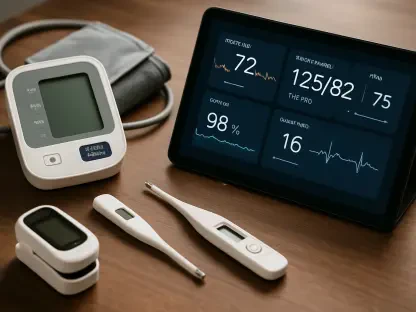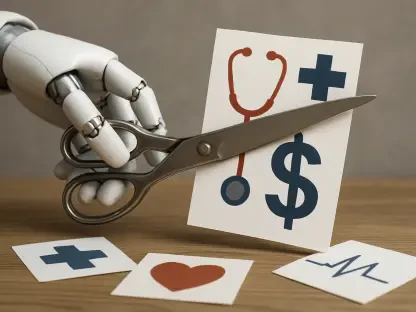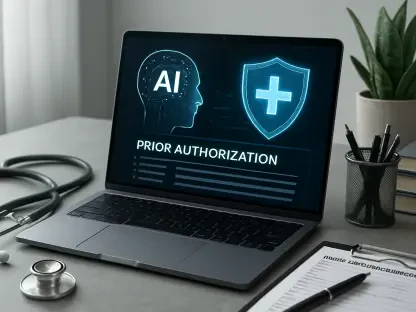Artificial Intelligence (AI) is proving to be an unprecedented force in revolutionizing healthcare. From enhancing patient care to streamlining operations, AI’s integration into healthcare systems promises a future of more accurate diagnoses, personalized treatments, and efficient administrative processes. However, ensuring the reliability and security of these advancements remains paramount.
The Role of ARPA-H in Healthcare Innovation
Establishing ARPA-H
ARPA-H, the Advanced Research Projects Agency for Health, was established by the Biden administration in 2022 with a mission to drive forward groundbreaking healthcare innovations. Modeled after its defense-focused counterpart, DARPA, ARPA-H focuses on making the impossible possible by tackling some of the most pressing health challenges, like chronic diseases and systemic healthcare issues. Renee Wegrzyn, the director of ARPA-H, describes the agency’s ambitious goal succinctly: “We are in the business of time machines, trying to help make what’s impossible possible.”
The agency employs program managers on a temporary basis to spearhead particular projects, which ensures a constant influx of fresh perspectives and new ideas. By rotating these managers, ARPA-H maintains a dynamic approach to problem-solving, free from long-term bureaucratic stagnation. This method aligns with its mission to foster rapid advancements and deliver innovative healthcare solutions that can significantly improve patient outcomes across diverse demographics.
Four Strategic Pillars
ARPA-H’s initiatives are structured around four main areas: Health Science Futures, Scalable Solutions, Proactive Health, and Resilient Systems. These pillars guide the agency’s efforts in pioneering new scientific discoveries, developing widely deployable technologies, promoting preventive care, and building robust, adaptable healthcare systems. Health Science Futures aims to create revolutionary scientific discoveries that will reshape healthcare. Scalable Solutions focuses on transforming these discoveries into technologies that can be widely deployed. Proactive Health emphasizes preventive measures to keep populations healthier, while Resilient Systems aim to develop robust systems capable of withstanding future challenges.
By concentrating on these pillars, ARPA-H seeks to develop a holistic approach to healthcare innovation. This structured yet expansive strategy enables the agency to address current health problems while also preparing for future challenges. The ultimate goal is to deliver equitable, innovative, and sustainable healthcare solutions that not only address immediate needs but also anticipate and mitigate future health crises.
AI’s Impact on Rural Healthcare
Addressing Disparities
Rural healthcare faces unique challenges, primarily due to a lack of access to specialized medical expertise and resources. ARPA-H is employing AI to bridge this gap by providing AI-assisted task guidance to remote healthcare workers. These intelligent systems can equip local healthcare providers with advanced knowledge and capability, thus elevating the quality of care in these underserved regions. The integration of AI into rural healthcare settings addresses significant inequalities by democratizing access to high-quality care, regardless of geographic location.
AI systems can offer real-time support and up-to-date medical information, enabling healthcare workers in rural areas to perform complex procedures and make informed decisions. This helps mitigate the lack of specialists and advanced healthcare facilities. Consequently, AI-assisted technologies could be a game-changer in improving the health outcomes of rural populations, who have historically been at a disadvantage due to the geographical and resource constraints of their locations.
Enhancing Remote Care
With AI’s assistance, remote healthcare workers can perform complex procedures and diagnostics with higher accuracy and confidence. Through interactive AI interfaces, healthcare workers receive real-time guidance and support, reducing errors and improving patient outcomes. This initiative not only addresses geographical disparities but also ensures that quality healthcare is more evenly distributed. AI-driven remote care can also alleviate the burden on urban healthcare facilities by providing effective treatments locally, thus reducing the need for patient transfers.
In practical terms, AI’s impact on remote healthcare could be transformative. An AI-driven system might guide a healthcare worker through a complicated diagnosis process, alerting them to potential risks and offering evidence-based treatment suggestions. This level of support means that even in the absence of on-site specialists, patients can receive high-quality care tailored to their specific conditions. Furthermore, AI can assist in monitoring chronic diseases remotely, ensuring that patients receive continuous care without frequent hospital visits, which is particularly beneficial for elderly or immobile patients.
Ensuring AI Reliability in Healthcare
Introduction to PRECISE-AI
A major concern with AI in healthcare is maintaining the reliability of AI tools when exposed to real-world, continuously evolving data. ARPA-H’s PRECISE-AI program focuses on this challenge by developing methodologies to keep AI systems reliable and effective over time. PRECISE-AI addresses the vital issue of AI tools’ adaptability and performance consistency as new data flows into the system, which is crucial for ensuring safe and efficient healthcare delivery.
The goal is to ensure that AI-driven tools consistently perform well, even as new data and circumstances arise. This involves creating algorithms and models that can learn from real-world data and update themselves to maintain accuracy. By focusing on robustness and flexibility, PRECISE-AI aims to build AI systems that healthcare professionals can trust in various clinical scenarios, thus improving overall healthcare quality.
Adapting to Real-World Data
One of the critical aspects that PRECISE-AI addresses is the adaptability of AI tools to real-world data. AI systems must evolve in response to new data to provide accurate and reliable results continuously. This adaptability ensures that healthcare professionals can trust AI tools in their decision-making processes, ultimately leading to better patient outcomes and streamlined operations. By consistently updating and refining AI algorithms, PRECISE-AI aims to mitigate risks associated with outdated or irrelevant data inputs.
Additionally, this process involves rigorous testing and validation phases to ensure that the AI systems can handle unforeseen scenarios and data variations. Addressing these challenges head-on allows for greater confidence in AI-driven diagnostic and treatment tools. It ensures that AI can be a reliable partner in the healthcare sector, capable of scaling up to meet the demands of evolving healthcare needs while maintaining the highest standards of accuracy and reliability.
Trends in Industry-Wide AI Adoption
Expanding AI Use Cases
The adoption of AI is on an upward trajectory across various industries, especially in healthcare. According to a 2024 report by Honeywell, over 90% of industrial AI leaders identify new AI applications during implementation phases. This signals a growing recognition of AI’s potential to transform operational efficiencies and drive innovation across sectors. In healthcare, this translates into more innovative diagnostic tools, automated administrative processes, and personalized treatment plans tailored to individual patient needs.
The report indicates that industries are continually discovering new applications for AI, which in turn drives further investment and interest in the technology. The ongoing refinement and expansion of AI capabilities mean that these systems are becoming increasingly valuable assets in healthcare settings, capable of tackling problems ranging from patient management to complex surgical procedures. As AI continues to evolve, its scope of applicability will likely broaden, leading to widespread, cross-sectoral benefits.
C-Suite Commitment
The commitment from C-suite executives is crucial in expanding AI applications within organizations. More than half of these leaders are already invested in broadening their AI solutions, indicating a top-down approach to integrating and leveraging AI’s capabilities. This trend highlights the strategic importance placed on AI in driving organizational growth and efficiency. C-suite involvement ensures that AI initiatives receive the necessary resources and support for successful implementation and scaling.
This level of commitment often results in a more cohesive strategy for AI adoption, encompassing everything from research and development to deployment and monitoring. By prioritizing AI, these executives underscore its importance in maintaining competitive advantage and fostering innovation. Consequently, their active participation can accelerate the incorporation of AI into essential healthcare functions, ultimately benefiting both providers and patients through more efficient and effective care.
Public-Private Partnerships in AI Development
Importance of Collaboration
Partnerships between public entities and the private sector are vital for advancing AI technology. Unlike DARPA, which benefits from consistent Department of Defense funding, ARPA-H counts on these collaborations to secure investments and drive their projects to advanced development stages. Such partnerships ensure a robust ecosystem where innovation can thrive and deliver real-world benefits, particularly in the healthcare sector. Collaborative efforts enable the sharing of resources, knowledge, and expertise, which accelerates the development and deployment of cutting-edge AI solutions.
By fostering these relationships, ARPA-H can leverage the strengths of both sectors to address complex healthcare challenges more effectively. Public-private partnerships provide a fertile ground for innovative ideas to take root and flourish, ensuring that pioneering technologies are not just theoretical but practically applicable and beneficial. This collaborative framework can help bridge the gap between research and real-world application, leading to sustainable advancements in healthcare.
Investment and Innovation
The investor community and commercial sector play a pivotal role in scaling AI-driven projects. By nurturing these relationships, ARPA-H facilitates the transition of innovative ideas from research labs to practical, deployable solutions in healthcare. This collaborative approach not only accelerates technological advancements but also ensures their viability and sustainability in real-world applications. Investors bring essential financial resources and business acumen that can help turn groundbreaking research into market-ready products and services.
In return, successful AI projects can deliver significant returns on investment, creating a win-win scenario for all stakeholders involved. By securing funding and support from the private sector, ARPA-H can scale its projects more effectively and ensure that pioneering healthcare solutions are accessible to a broader population. This symbiotic relationship between public agencies and private entities thus plays a crucial role in driving the future of AI in healthcare, ensuring that innovations have the backing they need to succeed and make a meaningful impact.
Cybersecurity: A Critical Aspect of AI in Healthcare
UPGRADE Program
As AI technologies become deeply integrated into healthcare systems, cybersecurity concerns rise to the forefront. ARPA-H’s UPGRADE program is an initiative designed to enhance cybersecurity standards and capabilities within the industry. The program focuses on universal patching and autonomous threat remediation, ensuring that healthcare technologies are both innovative and secure. By tackling cybersecurity proactively, UPGRADE aims to protect AI-driven systems from potential threats and vulnerabilities that could compromise patient data and system integrity.
The focus on universal patching means that all systems are kept up-to-date with the latest security protocols, which is essential in an era where cyber threats are constantly evolving. Autonomous threat remediation further strengthens these efforts by enabling systems to detect and neutralize threats without the need for human intervention. This level of security is crucial for maintaining the reliability and trustworthiness of AI tools in healthcare, ensuring that they can operate safely and effectively.
Protecting Sensitive Data
Artificial Intelligence (AI) is dramatically transforming healthcare, emerging as a groundbreaking force in the field. Through its ability to enhance patient care and optimize operational efficiency, AI is set to push the boundaries of what’s possible in healthcare. One of its key contributions is in improving diagnostic accuracy. Advanced algorithms can analyze medical data with remarkable precision, leading to more accurate diagnoses and, subsequently, more effective treatments. Moreover, AI is revolutionizing the way treatments are personalized. By analyzing a patient’s medical history and genetic information, AI can tailor treatments to individual needs, improving outcomes.
In addition to clinical advancements, AI is also streamlining administrative processes within healthcare systems. Automated systems can handle routine tasks, allowing medical professionals to focus more on patient care. Yet, as we embrace these innovations, maintaining the reliability and security of AI systems is critical. Ensuring that these technological advancements are both trustworthy and secure is paramount to their successful integration. The future of healthcare, enhanced by AI, looks promising, but it requires diligent oversight to ensure these benefits are fully realized.









